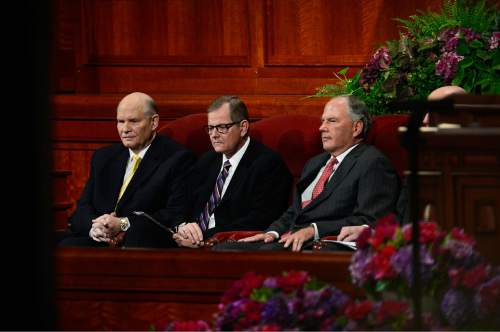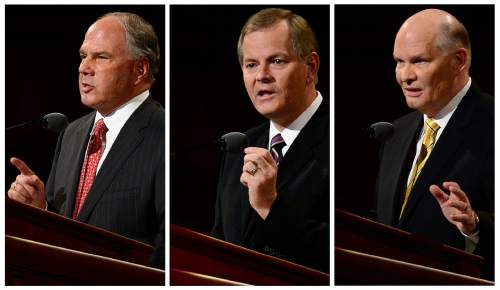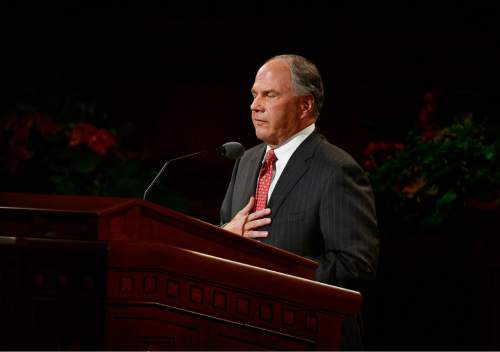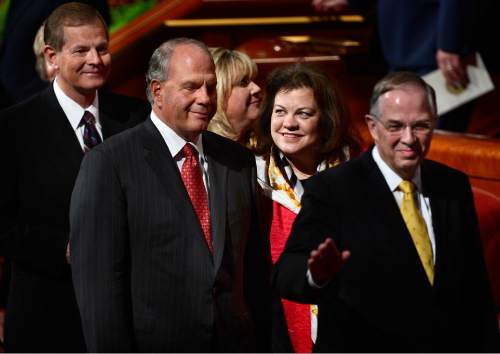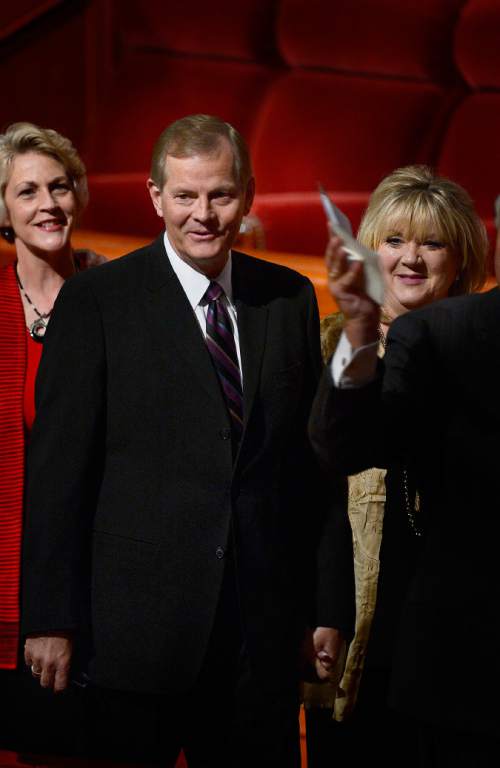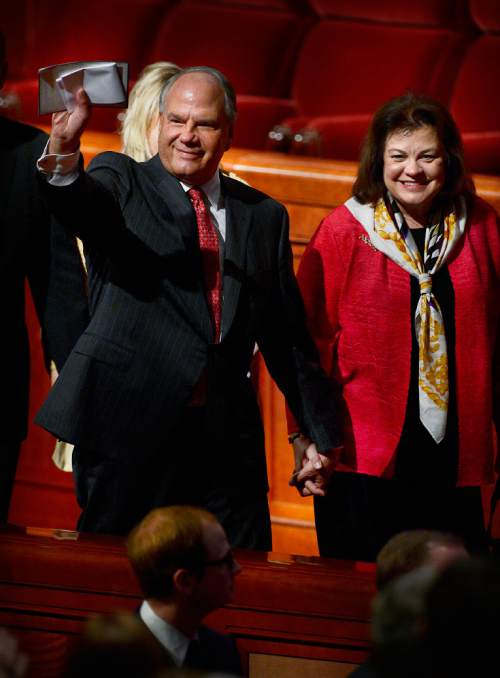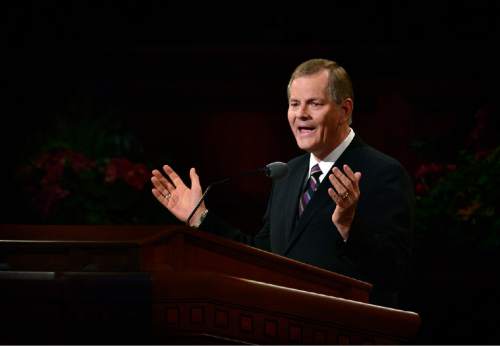This is an archived article that was published on sltrib.com in 2015, and information in the article may be outdated. It is provided only for personal research purposes and may not be reprinted.
They have been at this Mormon pulpit before.
Ronald A. Rasband, Gary E. Stevenson and Dale G. Renlund already had answered a call to full-time LDS Church service. They've spoken before at the faith's General Conferences. They know how to read off a teleprompter and make appropriate pauses.
But this time was different.
Having been elevated Saturday to fill vacancies created by the recent deaths of Mormon apostles Boyd K. Packer, L. Tom Perry and Richard G. Scott, the new men were addressing the LDS faithful Sunday for the first time as part of that elite group of 15 Mormon men — all considered "prophets, seers and revelators" — in The Church of Jesus Christ of Latter-day Saints.
Church President Thomas S. Monson welcomed the three as he opened the Sunday morning session of 185th semiannual General Conference and mourned the loss of the apostles they replaced.
The newcomers "are men dedicated to the work of the Lord," the 88-year-old Monson said. "They are well-qualified to fill the important positions to which they have been called."
Yet, speaking as apostles in the cavernous Conference Center, the men mentioned feeling inadequate and humbled by the task.
"I am overwhelmed and shaken to my very core to consider the import and significance of those words so tenderly spoken by our loving prophet," Rasband said, while vowing to "serve the Lord and you, with all of my heart, might, mind and strength."
The 64-year-old Rasband, who was the senior president of the LDS Quorums of the Seventy, talked about the love of Christ, saying, "I'm confident that there is no choice, sin or mistake that you or anyone else can make that will change his love for you or for them."
That does not mean Jesus "excuses or condones sinful conduct. I'm sure he does not," Rasband said. "But it does mean we are to reach out to our fellow man in love to invite, persuade, serve and to rescue. Jesus Christ looked past people's ethnicity, rank and circumstances in order to teach them this profound truth."
When Monson asked Stevenson, 60, to serve as an apostle, the presiding bishop responded with shock, followed by "a very undignified audible gasp," he said, and finally assent.
He then was overcome by "a tsunami of indescribable emotion, most of which were feelings of inadequacy," Stevenson said, but the Mormon prophet assured him that the Lord helps those whom he calls.
"I received a distinct impression which both chastened and comforted me," he said in his Sunday sermon, "to focus not on what I can't do, but rather on what I can do. I can testify of the plain and precious truths of the gospel."
The only way to fulfill this new assignment, Renlund said, was to see others as children of God and to give them the care that a loving Heavenly Father would want.
"This calling is not about me," said the newest LDS apostle — the 100th in Mormon history. "It's about the Lord, his work and Heavenly Father's children."
Renlund, 62, who had been serving in the LDS First Quorum of the Seventy, then described a life-changing experience he had as a cardiologist who dealt largely with heart failure and transplantation.
During his career, he had seen many of his patients die and had built up some emotional distance to deal with such regular loss — until Chad, who had developed heart failure and needed a transplant.
Chad did well for about 15 years, but died as a still-young man.
"I thought to myself, 'Chad had good care,' " Renlund said at the conference. " 'He has had many more years of life than he otherwise would have had.' "
But the doctor's equilibrium was shattered when Chad's parents came into the room and saw their dead son.
"I saw the great hopes and expectations they had for him, the desire they had that he would live just a little bit longer and a little bit better," he said. "With this realization, I began to weep. In an ironic reversal of roles and in an act of kindness I will never forget, Chad's parents comforted me."
From this, the new apostle concluded, "to effectively serve others, we must see them through a parent's eyes, through Heavenly Father's eyes."
Only then, Renlund said, "can we begin to comprehend the true worth of a soul."
The trio's familiarity with the Mormon system and way of speaking, no doubt, put the newly named apostles at ease in that setting and with their colleagues in the quorum.
Some Mormons, though, were disappointed in the appointments of the men — all Anglos from Utah and lifelong members.
These Latter-day Saints had hoped to see a non-American or man of color added to the presiding quorums, reflecting the increasingly global faith.
Still, said Mormon scholar Melissa Inouye, who teaches Asian history at the University of Auckland in New Zealand, these selections represent important progress.
"The calling of these apostles, while not a home run in terms of how global (non-North American) Mormons perceive their top leadership," Inouye wrote in an email, "is still a step in the right direction in terms of expanding international understanding."
Although Stevenson and Renlund are not ethnically Asian or African, they have "lived in Japan and in South Africa for long blocks of time. They speak the local language," she said. "Even if they don't speak it like natives, or even if they speak poorly, they understand the humbling feeling of becoming a complete idiot when you try to express yourself in a language that's not your own."
On top of that, Inouye said, "they and their families have developed deep relationships with local (non-North American) Latter-day Saint families."
Naming someone such as Renlund, she said, "can be seen as a win-win situation for people who simultaneously yearn for leaders with experience in the global South and with sympathy for women's issues."
Christians in the global South tend to be "much more socially conservative than their compatriots in the global North, and Mormons are no exception," she said. "The appointment of Elder Renlund, who has years of experience in southeast Africa, and whose wife is an accomplished lawyer and whose daughter went to Stanford, is good news on both fronts."
Lee Davidson contributed to this story.
Twitter: @religiongal


